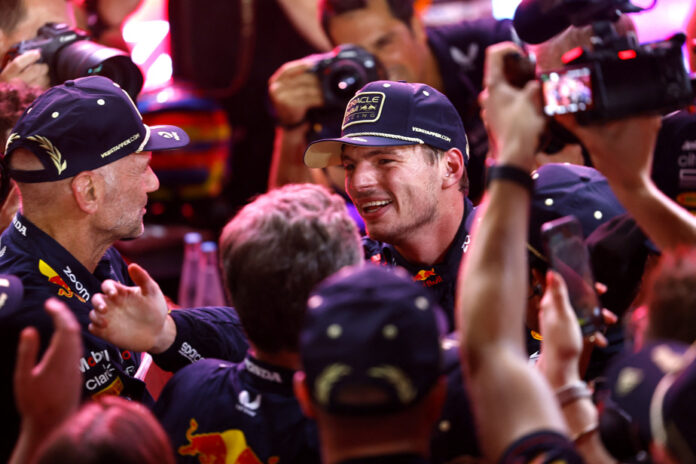(Doha) A driver “at the top of his game” at the wheel of the most efficient single-seater on the Formula 1 grid: this season, Max Verstappen and Red Bull have further cemented their position among the biggest names in F1 , sending the competition to the ground… and all suspense.
The figures are relentless: the Austrian team has already won 15 of the 16 Grands Prix contested since the start of the season with, at the center of the well-oiled Red Bull machine, a driver – “Its” driver – the now three-time world champion Verstappen, crowned on Saturday in Qatar.
Linked until 2028 with Red Bull, a very rare trust in F1, the Dutchman is “at the top of his game”, greeted team boss Christian Horner.
“He has this inner hunger, this determination and this enormous capacity that he channels,” he continued on the evening of the Japanese GP at the end of September, where the team won its second title in a row. At the same time, “Mad Max” scored its 13th success of the year.
At the wheel of a well-known Red Bull, the Dutchman even set a new record this season, that of the greatest number of victories in a row – ten, more than any other driver before him.
Well born, the RB19 is undoubtedly so: following on from its big sister, the RB18 with which Verstappen won his second title last year, the 2023 single-seater is almost unbeatable on the track.
With, for his opponents, the impression of belonging to “a Formula 2 field facing a Formula 1”.
“Things are what they are, it’s meritocracy,” Mercedes boss Toto Wolff admitted on Sky F1 after the Hungarian GP in July, where Verstappen won by more than 30 seconds. advances on his first pursuer. Giving Red Bull a record 12th victory in a row.
In addition to strategy and reliability, the strength of the single-seater, designed by engineer Adrian Newey, lies in efficiency combining speed on the straights with significant aerodynamic support.
However, by the Red Bull technical director’s own admission, the RB19 “is not very strong everywhere, it is simply ‘average-good’ everywhere”.
“It’s the result of a good compromise,” according to Pierre Waché.
Also, he reminds AFP: “domination depends on others […] we have made a very good car, but performance is never absolute, it is relative compared to others”.
The others precisely, at the forefront of which we find Ferrari and Mercedes, and who have never managed to hold their own against the overpowering Red Bull of Verstappen and, to a lesser extent, that of the Mexican Sergio Pérez, more in difficulty.
This supremacy does not mean that “Red Bull has the miracle solution”, tempers Frédéric Vasseur, head of Ferrari, the only other team so far to have won in the GP (in Singapore in September).
He continues: “I’m not sure we need to change anything, we need to improve everywhere, in every area, in every department.”
Improve to offer more battles at the front, something fans want, at a time when interest in the premier category of motorsport has continued to grow in recent years – thanks to the Netflix series Drive to Survive, but also to the epic fight for the title in 2021 between Verstappen and Lewis Hamilton (Mercedes).
To those who already see F1 losing interest, as Verstappen’s supremacy this season is so insolent, Stefano Domenicali, boss of the discipline, responded this summer to the Dutch daily De Telegraaf: “I am not at all worried […] ] Max is very dominant, but during races there’s a lot going on further back in the peloton.”
And for good reason. Without the strong man of the moment, the discipline would have known six different winners: in addition to his Red Bull teammate Pérez, victorious in two races and Carlos Sainz (Ferrari), winner in Singapore-Fernando Alonso (Aston Martin), Charles Leclerc (Ferrari ), Lewis Hamilton (Mercedes) and Lando Norris (McLaren) would also have tasted the joys of victory.
“We just have to take Max out of the equation,” said Toto Wolff ironically at the end of July.















